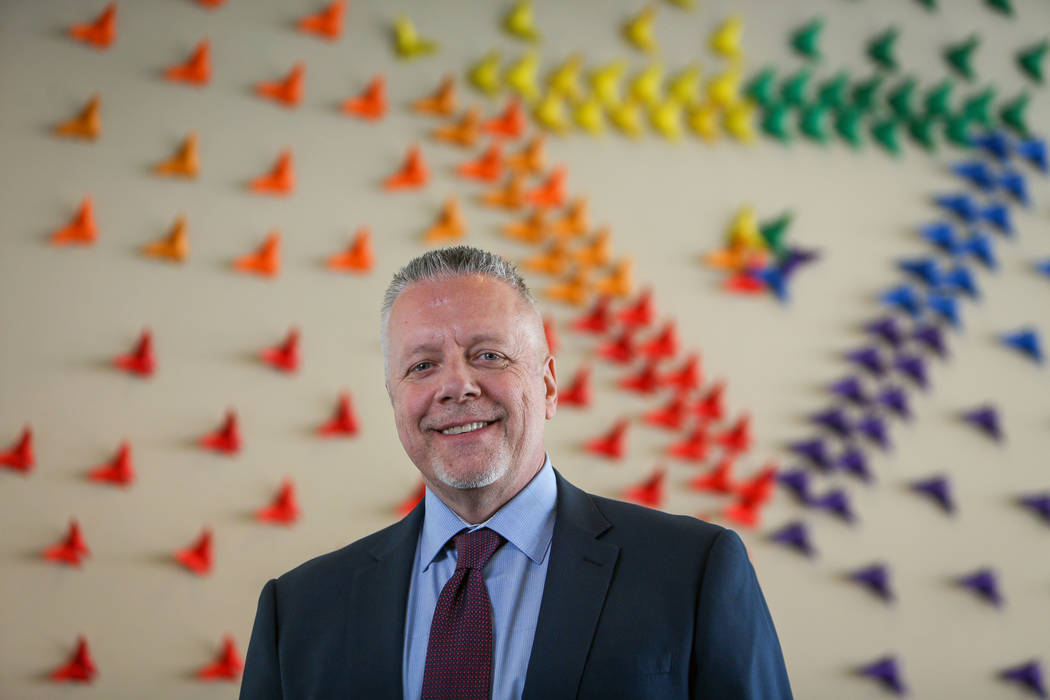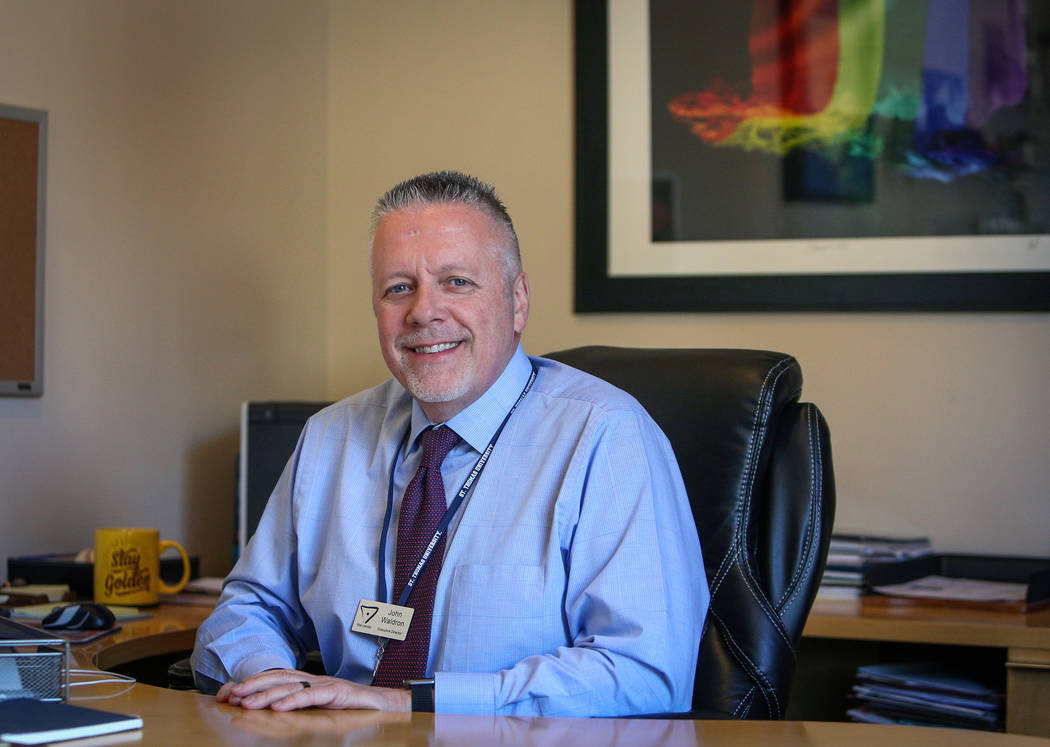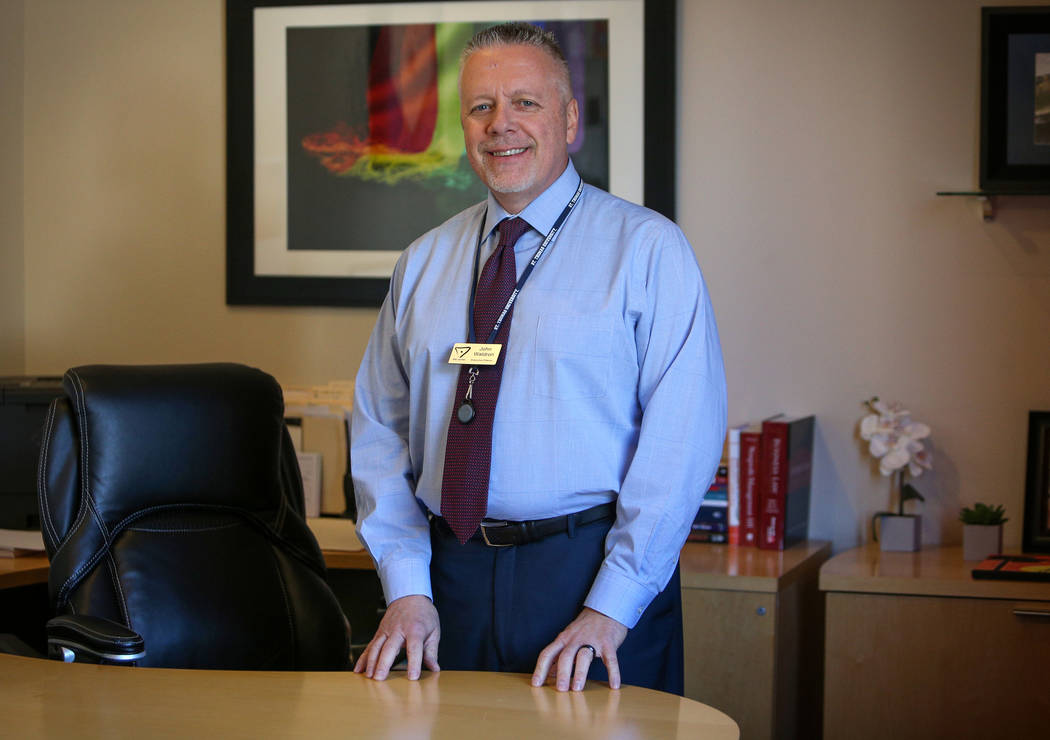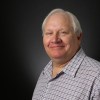The Center’s new director focuses on funding, visibility
Vegas Voices is a weekly series highlighting notable Las Vegans.
John Waldron came to Las Vegas at age 14. He didn’t want to be here, was mad at his parents for making him come here, and had no idea after arriving here where he wanted his life to go.
Waldron laughs. “If you could see that 14-year-old kid at Chaparral (High School) and tell anybody back then that he would earn a doctorate and head an organization as executive director, the laughter from people in my life would have been overwhelming.”
But Waldron acclimated well to Southern Nevada over the years and even grew to love the place. Last month, his Southern Nevada roots grew even deeper when he became executive director of The Gay and Lesbian Community Center of Southern Nevada, which for more than 25 years has been providing a raft of services — from counseling to support groups to free HIV testing — to Southern Nevada’s LGBTQ community.
For Waldron, it’s the latest stop in a career path that has seen him serve in management and leadership positions at the Las Vegas Review-Journal, where he was director of advertising operations; the nonprofit Opportunity Village, where he was director of organizational development; and Boyd Gaming, where he was manager of learning and development.
Waldron, 54, was born in Queens, New York, and grew up on Long Island. His mother was a certified nursing assistant at a nursing home and his father worked for Timet. When his father was transferred to Henderson’s Timet plant — which produces titanium for use in aviation and other industries — the family moved here.
“It was horrible,” Waldron says. “I was so mad. That’s the best way I can describe it. I was just mad that our parents uprooted us and took us out West.”
“And everybody made fun of my New York accent, which is why I lost it very rapidly. But when I get on the phone with my mother, it comes out.”
After graduation, he served in the Army, returned home and, at 25, landed an entry-level job in the ad operations department of the Las Vegas Review-Journal. Waldron says it was a life-changing job that gave him a sense of direction, introduced him to mentors that would help him along the way and inspire a continuing interest in leadership development.
Review-Journal: You touch often on the importance of mentors, both generally and to you, personally.
John Waldron: At the Review-Journal, I was still trying to find out what to do with my life. I found direction, and (former advertising director) Jack Harpster brought me in his office one day. I was 26 years old, and he basically worked out a mentoring relationship with me. I didn’t even understand what the word “mentor” meant. He just told me, “If you take the chances, I’ll open the doors for you.” I did, and every time he opened the door, I made sure I went through. … All through my life, there was always somebody there that opened the doors like that. So I’m a product of people making opportunities for me, which is why I try to incorporate that in the leader I am here as well.
What do you envision as your mission at The Center?
To help The Center to truly become the hub of all things LGBTQ for Southern Nevada. That’s what The Center was designed to be. We’ve had some situations over the last few years where we’ve seen fewer people come to The Center, but now we’re starting to really invest in programming that’s really bringing more people back here.
It seems that The Center had been going through a rough period lately …
I think part of it has been turnover in the executive director. It’s no secret that I’m the sixth one (in about five years). And I don’t know all of the particulars (with) my predecessors, but in any nonprofit going through that, the donor base (will have) eroded. So we’re working hard to reconnect with our supporters in the community, the ones who helped to build The Center, we’re working hard to reconnect with our corporate sponsors. So one of the things I’ve done is I’ve made a very public commitment to the staff here as well as to our community that I’m going to be around for a while and I’m going to see it through.
What are the immediate challenges you face?
We have a great mission here to enhance the lives of the LGBTQ community and we do many great programs, but on a very practical level we can’t do those programs without funding. So one of our great challenges is to increase our funding and support from the community. Some other challenges we have are just reassuring people in the LGBTQ community that we are a safe place, where our doors are wide open to everybody who identifies as part of LGBTQ. We have programs for them and we are open to fresh ideas on doing things that, perhaps, we haven’t done in the past. One of the groups we’re reaching out to in particular is our transgender community. There’s no group within LGBTQ that’s more stigmatized right now than the transgender community, and we want them to know this is a safe and affirming place for them.
How do you get word about The Center out to the community?
We have to tell our story. I don’t think we tell our story enough. There are really impactful things that happen out of The Center that make a difference in people’s lives, that change people’s lives. When you look at your youth group and have people who are finding a place where they can build connections and get involved in programs, you hear those great success stories. We have people come through our door who have been victims of human trafficking, victims of crime and abuse, and we have people trained at The Center … to respond to those people’s situations and get them the support they need.
Contact John Przybys at jprzybys@reviewjournal.com or 702-383-0280. Follow @JJPrzybys on Twitter.
Getting to know: John Waldron
Daily ritual
I'm a big podcast listener. I don't listen to music in the car every morning. I try to listen to something that helps me intellectually.
Favorite movie
It's not going to be very intellectual, but "The Goonies." I love that. And "Good Will Hunting."
Favorite musician
Eddie Vedder of Pearl Jam. I think he's a brilliant songwriter.
Favorite author
John Steinbeck. "East of Eden" is just a brilliant piece of work.
Place I'd live if not Las Vegas
San Diego. I think it's the most perfect place on Earth in terms of weather.
Favorite sport
I'm a baseball fanatic. I'm a passionate New York Mets fan. A long-suffering New York Mets fan.
Ringtone
Theme from "The Big Bang Theory"
Place you always take visitors
Valley of Fire
Favorite quote
"You can't always see the picture when you're stuck in the frame." (By Les Brown)
I never leave the house without …
My iPad
Food I could eat every day
Pad Thai
Other occupation I would have pursued
Social psychologist, because I'm fascinated why do the things they do and why we behave the way we do.

























